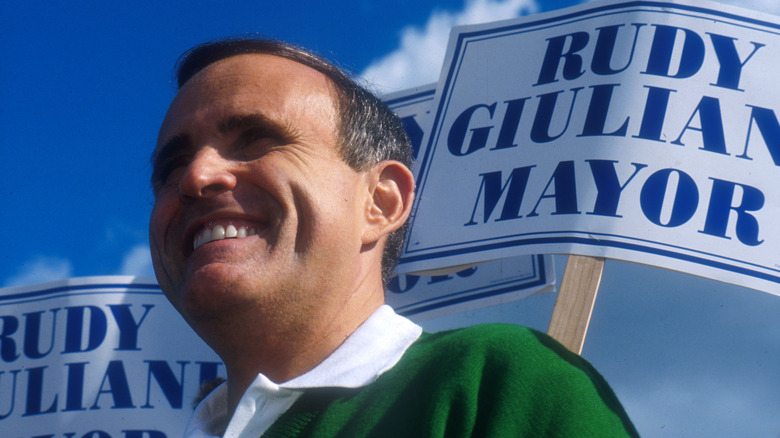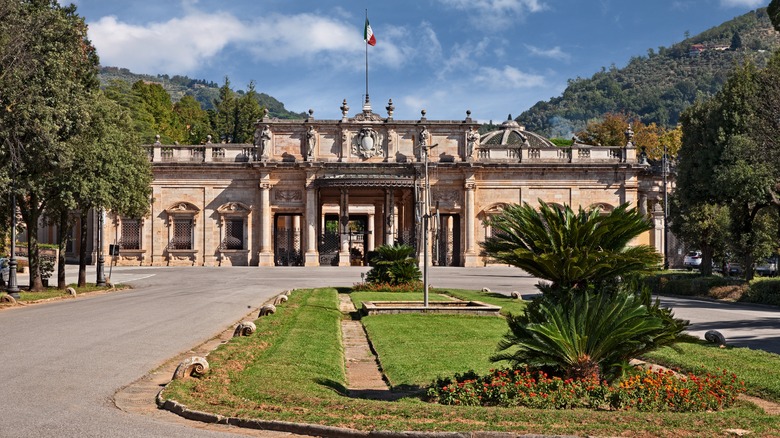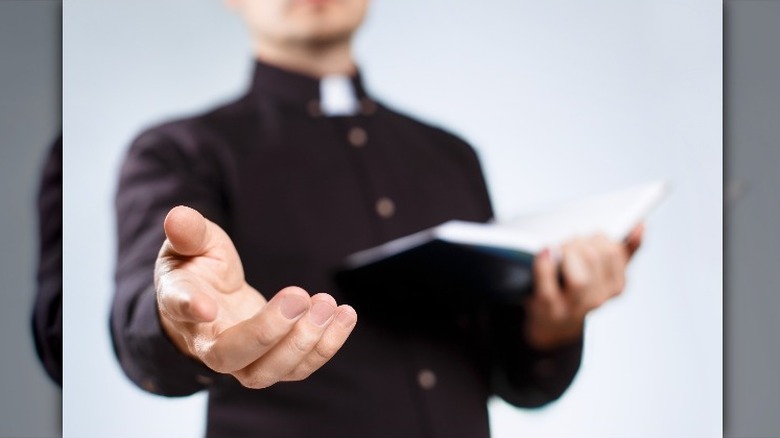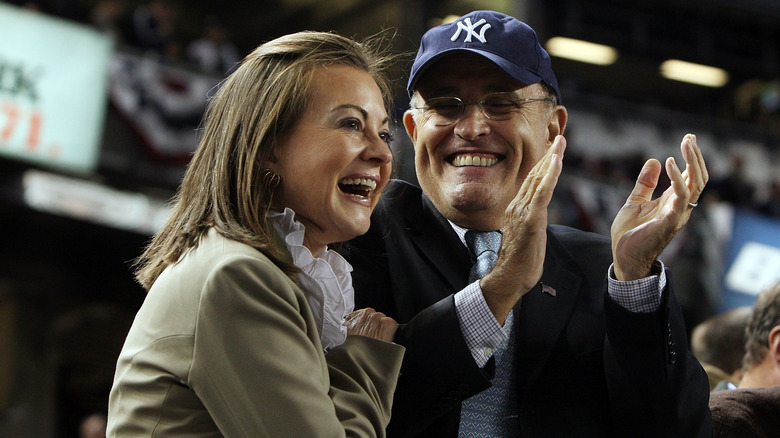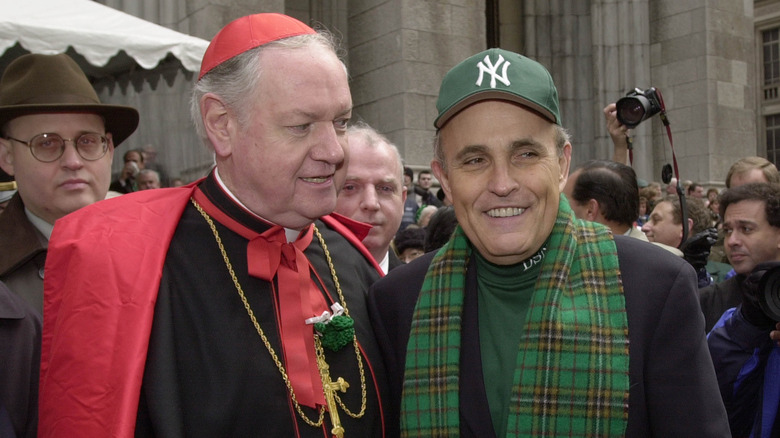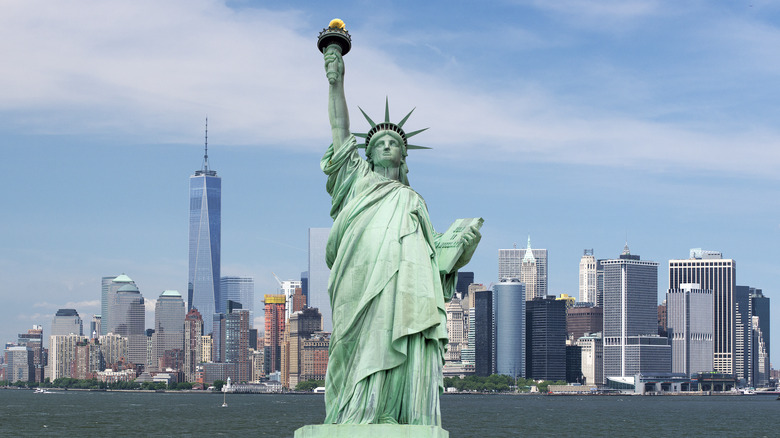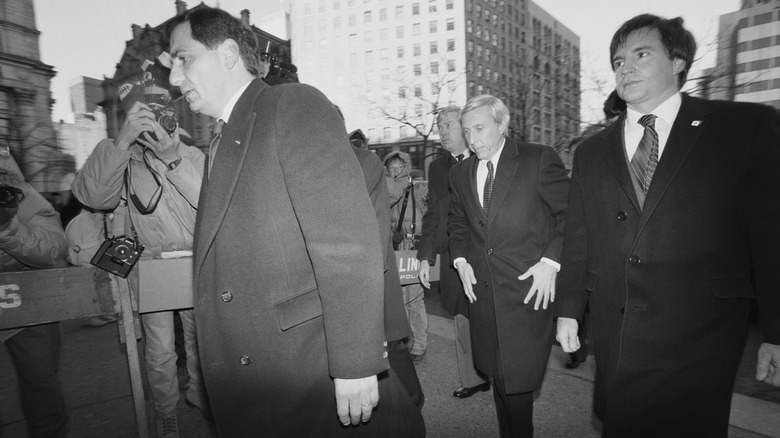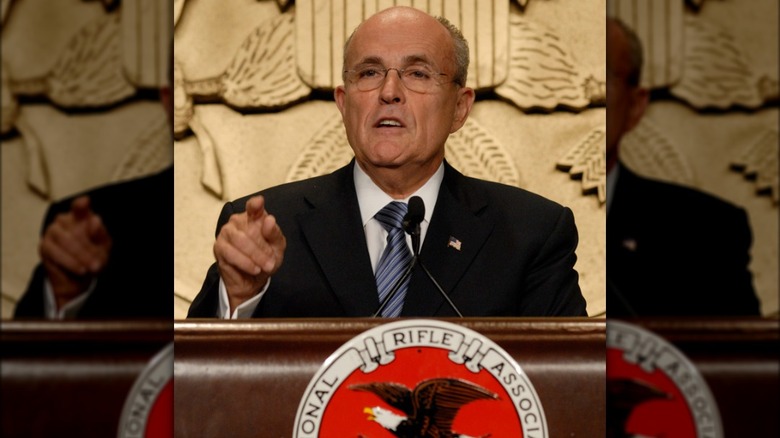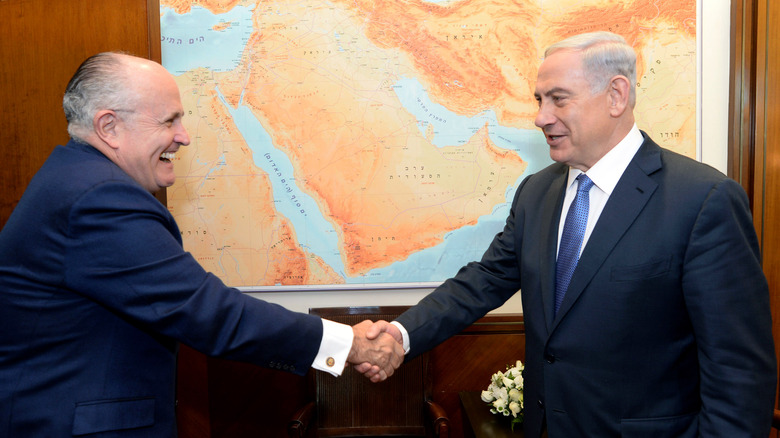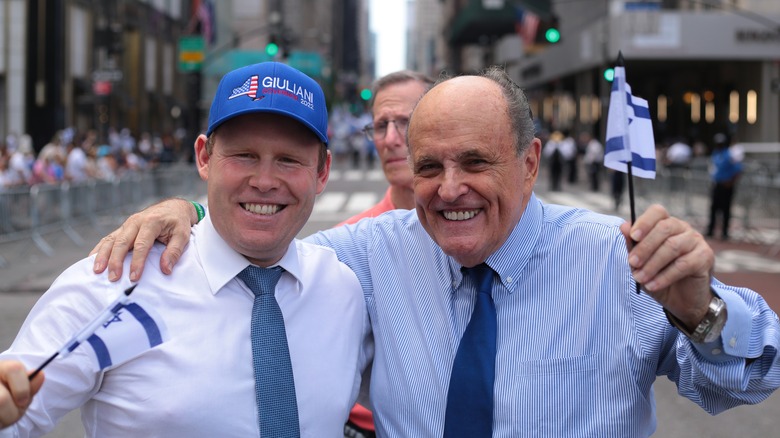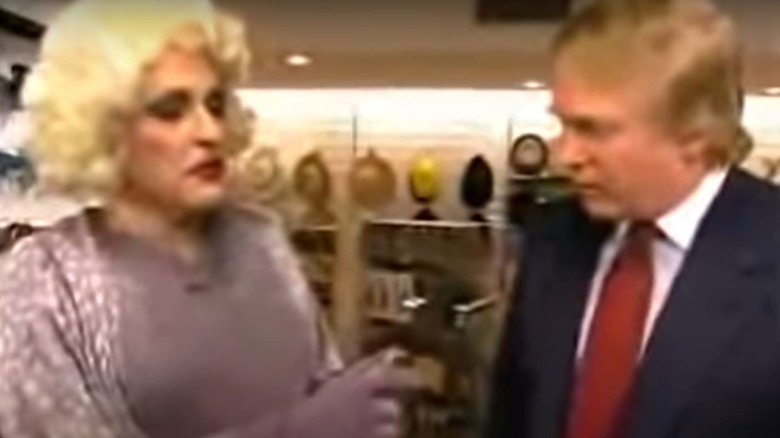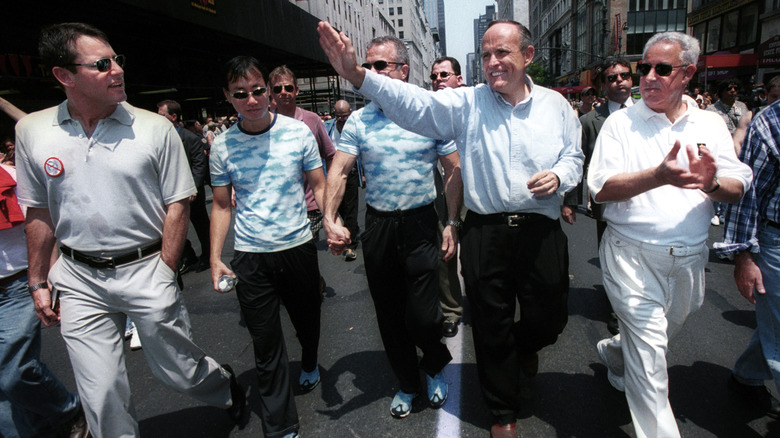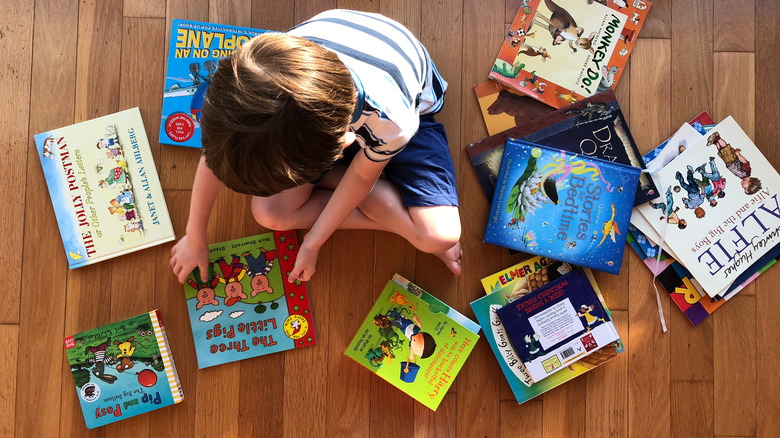What You Never Knew About Rudy Giuliani
Rudy Giuliani has been in the spotlight lately over his work for the Trump administration, particularly over his allegations of electoral fraud in the hotly-contested 2020 U.S. presidential election. But before he became a political operative of the Republican Party, Giuliani was best known as "America's Mayor." Per NY1, he gained notoriety for his leadership following the September 11 attacks, showing strength while comforting grieving families of the victims and the first responders that met their deaths trying to rescue them. Per City-Journal, he was also credited — along with the NYPD — for New York's drastic reduction in crime during his tenure in the 1990s through the expansion of police presence and crackdown on quality-of-life crimes as a deterrent to more serious crimes such as murder and drug dealing.
Giuliani is a highly-polarizing figure on the political scene, and this reputation had spilled over into his private life too. People either love him or hate him, whether for his commitment to Israel, support of gay rights and gun control, or his willingness to break with the Catholic Church on issues such as abortion and divorce. Here are things about New York's former mayor that often pass under the radar.
He is of northern Italian heritage
As his name suggests, Rudolf Giuliani is of Italian descent through both of his parents. Being a native of New York, which received massive Italian immigration all the way through to the early 1960s, this should come as no surprise. Giuliani, however, is a bit of an anomaly. As PBS notes, the vast majority of Italians in New York descend from a large wave of immigrants from Southern Italy and Sicily, which experienced crushing poverty and famine in the 1870s.
Per the New Yorker, Giuliani was born to Harold Giuliani and Helen d'Avanzo. His mother was unsurprisingly of Neapolitan descent from the Campania region of Italy. His paternal grandparents, however, were from a small Tuscan Florentine-area town called Montecatini. In the 19th century, however, the recently-united country was experiencing rapid economic and political changes that drove many to emigrate from the northern half of the country too. According to the Political Science Quarterly, the regions of Piemonte, Lombardy, Veneto, and Tuscany all provided immigrants to the United States as well, although in much smaller numbers. Giuliani's grandparents were among these, settling in New York city where their grandson would make his name as "America's mayor." Giuliani's Italian immigrant heritage would also influence his faith and political views as he climbed the ladder of New York politics to the city's highest elected office.
He wanted to be a priest
Growing up in an Italian household, Rudy Giuliani was raised Catholic. In an interview with Hugh Hewitt, Giuliani looked fondly upon his childhood, noting that he attended two Catholic grammar schools and then a Brooklyn Catholic high school, from which he graduated in 1961.
Giuliani, as noted in the interview, was never an altar boy (unlike fellow New York politicians Mario and Andrew Cuomo). But he did describe himself as "a very religious kid" that eventually felt called either to the priesthood or medicine. He settled on attending seminary after graduation. According to the Hartford Courant, this decision was in part influenced by one of his teachers, a priest named Jack O'Leary. This priest had slapped a young Giuliani across the head for misbehavior in class, but eventually earned his pupil's respect and admiration.
Giuliani was on the verge of attending seminary but changed his mind over the summer of 1961. In the end, he decided to attend Manhattan College instead, compensating for his departure from the priestly vocation by studying theology during all four years of college. In his 2002 book "Leadership" (via Cleveland 19), there was another reason why Giuliani decided to eschew the seminary: He liked girls too much and couldn't fathom taking a vow of clerical celibacy. Thus, instead of becoming Father Rudy, he began a path that would turn him into Mayor Rudy and bring him into direct conflict with the Catholic Church.
He married his cousin
Rudy Giuliani is well-known in America for his many marriages, infidelities, and divorces. According to the IB Times, his first marriage was to a substance abuse prison counselor named Regina Peruggi, whom he married in a Catholic ceremony in 1968. This marriage ended in 1982 under strange circumstances, as the couple allegedly discovered that they were second cousins. Now, it is unclear whether Peruggi and Giuliani were aware of their blood relationship upon marriage. Per the NY Daily News, Peruggi and Giuliani grew up together, so it is hard to believe they were unaware of being cousins. It was enough for him, however, to obtain an annulment from the Catholic Church, which opened a whole different can of worms.
As noted on the USCCB's site, annulment can only be granted if some condition or fact surfaces about a marriage that determines that the bond of marriage never existed. So in order to have obtained an annulment in his first marriage the proper way, Giuliani cannot have known that Peruggi was his cousin. This raised eyebrows, since the two had known each other as children, and the NY Daily News accused him of abusing his connections inside the Catholic Church to obtain an annulment he should never have had. But the controversy is of little surprise. The former mayor has a checkered relationship with the Catholic Church, which has targeted him specifically for criticism over his political positions.
His relationship with the church is tenuous
Despite growing up Catholic and almost becoming a priest, Rudy Giuliani's relationship with his childhood faith is difficult, to say the least. Per Cleveland 19, Giuliani said he preferred to keep his faith private and leave matters of religions to priests. But observers suggest that his refusal to fully discuss his faith stem from the fact that the Catholic Church is no fan of Giuliani due to his politics and lifestyle.
The Catholic Church has a myriad of problems with Giuliani. His civil marriage to Judith Nathan was considered adultery because the Church considered him still married to Donna Hanover. The church is also no fan of Giuliani's "proudly pro-choice" abortion record, per CNN. Regardless of his actual beliefs, the Catholic Church's Canon 915 de facto excommunicates public figures in a state of visible sin — including politicians. Visible sin includes advocating for legal abortion.
The Catholic hierarchy criticized Giuliani for his positions. Cardinal Raymond Burke of St. Louis (via CBS) proclaimed that he would refuse the former mayor communion if he was at his Mass. When Giuliani received at a papal mass in 2008, Cardinal Edward Egan of New York said that he had sinned in doing so and called on the mayor and a handful of other Catholic politicians to refrain from communion to avoid putting priests in difficult and potentially-embarrassing positions (via the New York Times).
He was considered soft on immigration
When Donald Trump ran for president in 2016, among the centerpiece campaign promises was to curb illegal immigration. Thus, it was somewhat surprising (for those who lived under him in New York) that Rudy Giuliani would throw his support behind an immigration hawk such as Trump, since during his tenure as mayor, Giuliani protected immigrants from deportation.
According to CNN, Giuliani had a long record of pro-immigration statements. In 1994, he claimed that he had no intention of deporting anyone that came to New York to work and contribute, regardless of immigration status. He also sued the federal government over welfare reforms that required state employees to report immigration status. Giuliani wanted only to include those accused of serious felonies.
No matter how much immigration enforcement cracked down, some were always going to slip through the cracks. Thus, it was better to let them work and contribute to the city economically than go through the expensive immigration enforcement. But as noted in the New Yorker, Giuliani comes from an immigrant family. Given that Italians such as his family were fleeing abject poverty, it would not be a surprise that the former mayor harbors sympathy for immigrants seeking a better economic situation for themselves and their families. And if they were willing to work, he was willing to welcome them to the Big Apple — regardless of immigration status.
He got insider trading laws enforced on Wall Street
Per an article in Science, the 1980s and early '90s were an era of corporate mergers, banking crises, and buyouts thanks in part to reduced oversight that allowed these bids to go through. Wall Street reaped massive profits in this period, and many of its members got immensely rich. But as usual, there was a good bit of criminal activity, too, and Rudy Giuliani was tasked with breaking it up.
According to Investopedia, Wall Street arbitrageur Ivan Boesky came to the SEC's attention in the mid-1980s. Boesky was the face of Wall Street excess. Per the American Law Library, he famously uttered the phrase "greed is good" and loved the conspicuous consumption associated with the nouveau-riche. In this scheme, Boesky and his associates purchased stock right before mergers, which caused their value to skyrocket, went into effect. Since Boesky had used non-public information, he was indicted for insider trading.
Giuliani, then a prosecutor, was tasked with pursuing the Boesky case. Boesky, however, faced with federal felony charges and a lengthy prison sentence, took a plea deal. He paid $100 million in fines, received three years in prison (served in California), and agreed to become a federal informant, indicting his associates (including financier Michael Milken). He was, however, banned from all Wall Street securities activity. Per Bloomberg, Congress was eventually motivated to tighten insider trading laws on Wall Street, although it left some loopholes for Congress that were not officially closed until 2012.
He helped pioneer gun manufacturer lawsuits
Being from Democratic New York City, Rudy Giuliani has frequently supported policies that are often anathema to Republican voters, chief among them gun control legislation. Yet, in 2016, he was up for a Trump administration job, despite, as the Trace notes, having a record that would have brought the NRA out in force against him.
Giuliani was always a supporter of stricter gun control laws until he ran for president. In 1995, he criticized the Republican Party's approach to handguns and assault weapons as a "terrible mistake" that had created carnage in American cities such as his native New York. He agreed with the Clinton administration that federal registration of handguns — the most commonly-used firearm in urban homicides — was a good thing.
Giuliani, per the New York Times, also joined other large cities in lawsuits against gun manufacturers whenever their handguns were used in crimes. The funds would compensate victims of violence. Gun rights activists argued that the policies were politically motivated and would not prevent crime or save lives, while the administration said that it was basing policy on crime statistics. Either way, the lawsuits would haunt Giuliani in his 2008 presidential run. When he spoke before the NRA, his appearance, per Reuters, failed to convince his audience, given his gun record as New York mayor.
He is strong supporter of Israel
As noted in the Jewish Telegraphic Agency (JTA), Rudy Giuliani won the 1993 New York City mayoral election thanks in part to the Jewish vote. Among the reasons was his strong support for Israel. As New York City political operative Hank Sheinkopf noted (via the American Prospect) support for Israel, Ireland, and Italy, was practically a prerequisite to holding office in New York. Thus, it is tempting to view Giuliani's relationship with Israel as politicking. But Giuliani and Israel go way back, suggesting his support is genuine.
As noted in the JTA, Giuliani visited Israel while he was still an attorney — well before his mayoralty in the 1980s — and he has backed Israel at almost every turn. When a spate of bombings rocked Jerusalem in 1996, Giuliani made a two-day visit to the country in solidarity and roundly criticized Palestinian leader Yasser Arafat, a man whom he personally disliked. Per the New York Times, he praised the American relationship with Israel and called for greater anti-terrorism cooperation between the two countries. Later, when visiting an Israeli memorial to the 9/11 attacks, Israeli Prime Minister Ehud Olmert called him personally to request a piece of the Twin Towers for the memorial (via JNF). Thanks to his record, Haaretz reported that an Israeli panel on the 2008 presidential election had declared Giuliani the "best presidential candidate for Israel." Today, Giuliani attends the Israel Day Parade, held yearly in New York (via HuffPost).
His son was kicked off Duke's golf team
Rudy Giuliani had two children by his second wife. His son Andrew eventually went to Duke University, where he played on the golf team. Now, according to Golf Digest, the younger Giuliani was not much of a star. He was a "second stringer" at a nationally-renowned program who made the sports headlines for all the wrong reasons.
Andrew was booted off the golf team mostly for bad behavior. Per the lawsuit the younger Giuliani filed in court, he was not a team player and frequently argued with the coaching staff. He threw and broke one golf club, and allegedly drove his car onto a football practice field while the team was training there.
According to Duke, Andrew had done much worse. He had not accidentally thrown the club. He had smashed it in anger against his bag and broken two different ones — not one as the lawsuit alleged. He drove recklessly around the golf course in areas trafficked by families with children, verbally abused his teammates, and even hit a teammate in the face with an apple. Now, Andrew's high school coaches and teammates were stunned by the accusations, noting that he had always been a disciplined, mature teammate under their supervision. Some Duke acquaintances conceded that he had done some stupid things, but nothing meriting expulsion from the team. Nevertheless, the judge saw it differently and laughed the lawsuit out of court, and the Duke golf program's decision to ban him stood.
He dressed in drag a few times
According to Vice, Rudy Giuliani cracked down on New York's illicit nightlife, forcing bars to tighten carding rules to ensure that minors did not enter and destroying "fun city" for what critics referred to as an over-sanitized, safe-for-tourists New York. Among the victims of his policies were drag bars. Nevertheless, Giuliani indulged in some fun himself on the Inner Circle Show in 1997. Per the New York Times, Giuliani shocked the audience at the New York Hilton Hotel by strolling onto the stage wearing a blond wig, pink gown, and tons of makeup, dubbing himself "Rudia." He sang "Happy Birthday, Mr. President" and danced with Julie Andrews on stage.
As noted in the New York Times, it was the first reported time a New York mayor had appeared in drag, but Giuliani thought it quite apt to describe his politics. Julie Andrews was a woman pretending to be a man pretending to be a woman. Giuliani called himself a Republican pretending to be a Democrat pretending to be a Republican. Who thought drag could summarize politics?
Giuliani would go on to dress in drag again in 2000. He appeared on the Inner Circle again, this time with future president Donald Trump. Here, according to People, Donald Trump tried to "seduce" Giuliani and even motor-boated Giuliani's fake chest. The mayor then slapped Trump and walked off. Trump's response? "Can't say I didn't try."
He promised to marry a gay couple but never did it
According to the LA Times, Rudy Giuliani vacated New York's Gracie Mansion in 2001 after he announced his divorce from his second wife Donna Hanover and crashed with a gay couple — Howard Koeppel and Mark Hsiao — at their Upper East Side high rise. Now, these men had been Giuliani's friends for years and asked him to officiate their wedding once it became legal in New York. Giuliani promised to do so.
New York legalized gay marriage in 2011, per the Atlantic, so Koeppel called the mayor to deliver the decade-old promise. Instead, as Politico reported in 2009, Giuliani came out guns blazing against New York's gay marriage bill, and did not officiate for his friends. Gay and lesbian organizations slammed his reversal as cheap pandering to the Republican party. Giuliani claimed in an astonishing reversal that he had always believed that marriage was solely between a man and a woman, a position that he flip-flopped on again in 2016.
According to the Washington Post, Giuliani officiated a gay wedding for the first time for one of his legal partners from a law firm he worked at, suggesting that he is not personally opposed to the practice. So what about his old friends? The Atlantic said it is okay for people's positions on socio-political issues to evolve. But Giuliani could have at least returned their calls to explain himself.
He wrote and promoted children's books
In 1998, Rudy Giuliani authored a children's book called "What Will You Be" (via New York Times) and celebrated its release by reading it to the children of Chinatown's Public School 1. The book showcased Giuliani's dog alongside a host of children dreaming of their future careers and occupations, from astronaut to mayor of New York. The dog, meanwhile, aspires to read "The Joy of Napping." Giuliani claimed that he wrote the book to inspire children to aim high and achieve their career dreams through work and dedication — despite the obstacles they would inevitably face along the way. He also suggested it was okay to change plans. After all, the mayor himself had gone from dreaming of being a NY Yankee to a priest, doctor, and finally, lawyer.
Per the NYC government website, Giuliani was involved in the release of a second book called "A Day in the Life of a Mayor." Now, he did not write it. The author was Liza Burby. The book, however, featured Giuliani and was meant to give children an idea of the responsibilities and challenges that accompany public service. It was not meant to dissuade them. Instead, Giuliani and Burby wanted to encourage children to set goals and surmount these challenges by putting 110% effort into their dreams. This book was the latest in a series that covered professions such as architects, doctors, and librarians. It turned out to be quite a success.
